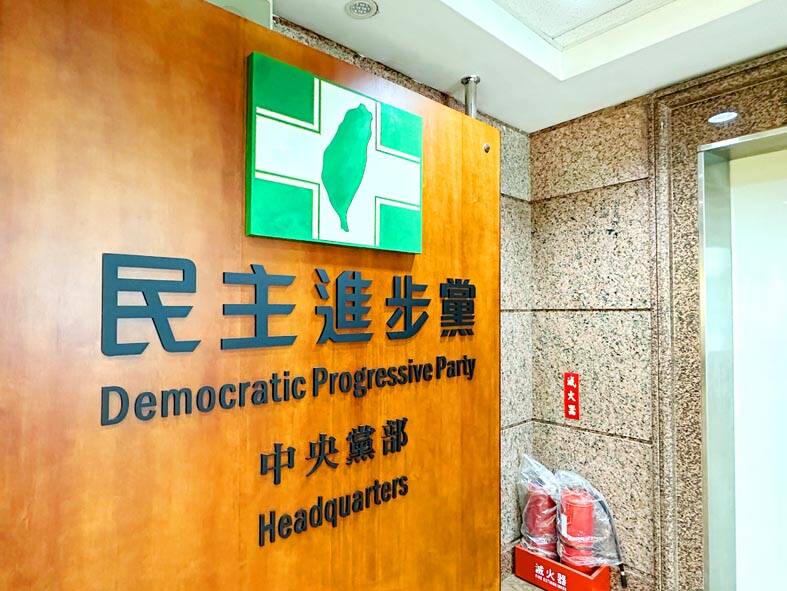Passage of Article 23 of the Hong Kong Basic Law by the territory’s legislature marked “the darkest day for Hong Kong,” the Democratic Progressive Party (DPP) said yesterday, adding that it “strongly condemned” the Beijing-backed bill.
The legislation completed Beijing’s totalitarian takeover of Hong Kong, and the final destruction of the rule of law and human rights that had survived in the territory, the DPP said in a news release, citing the bill’s broad definition of “breaching national security.”
Implementation of Article 23 would have a chilling effect on speech and put every business, non-governmental organization (NGO) and foreigner working in the territory in legal jeopardy, the party said.

Photo: Chen Yun, Taipei Times
Officials at the Chinese Communist Party National Congress in Beijing brazenly ordered the nominally autonomous territory to pass the latest bill, which was done in less than two weeks, the DPP said.
The events show that the Hong Kong government and legislature have become the “thugs and rubber stamps” of China, it said.
China’s behavior in Hong Kong, which contravenes universal values and guarantees made by Beijing, was a demonstration of the regime’s totalitarian character and discredited its “one country, two systems” formula for Taiwan, the party said.
The DPP supports the international effort to help Hong Kong, safeguard democracy and counter totalitarianism, and it remains committed to protecting sovereignty and freedom at home, it added.
The so-called “1992 consensus” and offers of “peaceful reunification” are rhetoric meant to dress up Beijing’s ambition to annex Taiwan, the party said, adding that Taiwan must show strength to protect national security and peace.
The “1992 consensus,” a term former Mainland Affairs Council chairman Su Chi (蘇起) in 2006 admitted making up in 2000, refers to a tacit understanding between the Chinese Nationalist Party (KMT) and the Chinese government that both sides of the Strait acknowledge there is “one China,” with each side having its own interpretation of what “China” means.
KMT Culture and Communications Committee director Lee Yen-hsiu (李彥秀) said that the passage of the legislation underscored “the preciousness of freedom and democracy enjoyed in the Republic of China, Taiwan.”
The KMT urges Beijing to consider whether suppressing individuals’ freedom would bring about better governance, Lee said.

Nipah virus infection is to be officially listed as a category 5 notifiable infectious disease in Taiwan in March, while clinical treatment guidelines are being formulated, the Centers for Disease Control (CDC) said yesterday. With Nipah infections being reported in other countries and considering its relatively high fatality rate, the centers on Jan. 16 announced that it would be listed as a notifiable infectious disease to bolster the nation’s systematic early warning system and increase public awareness, the CDC said. Bangladesh reported four fatal cases last year in separate districts, with three linked to raw date palm sap consumption, CDC Epidemic Intelligence

The manufacture of the remaining 28 M1A2T Abrams tanks Taiwan purchased from the US has recently been completed, and they are expected to be delivered within the next one to two months, a source said yesterday. The Ministry of National Defense is arranging cargo ships to transport the tanks to Taiwan as soon as possible, said the source, who is familiar with the matter. The estimated arrival time ranges from late this month to early next month, the source said. The 28 Abrams tanks make up the third and final batch of a total of 108 tanks, valued at about NT$40.5 billion

Two Taiwanese prosecutors were questioned by Chinese security personnel at their hotel during a trip to China’s Henan Province this month, the Mainland Affairs Council (MAC) said yesterday. The officers had personal information on the prosecutors, including “when they were assigned to their posts, their work locations and job titles,” MAC Deputy Minister and spokesman Liang Wen-chieh (梁文傑) said. On top of asking about their agencies and positions, the officers also questioned the prosecutors about the Cross-Strait Joint Crime-Fighting and Judicial Mutual Assistance Agreement, a pact that serves as the framework for Taiwan-China cooperation on combating crime and providing judicial assistance, Liang

A group from the Taiwanese Designers in Australia association yesterday represented Taiwan at the Midsumma Pride March in Melbourne. The march, held in the St. Kilda suburb, is the city’s largest LGBTQIA+ parade and the flagship event of the annual Midsumma Festival. It attracted more than 45,000 spectators who supported the 400 groups and 10,000 marchers that participated this year, the association said. Taiwanese Designers said they organized a team to march for Taiwan this year, joining politicians, government agencies, professionals and community organizations in showing support for LGBTQIA+ people and diverse communities. As the first country in Asia to legalize same-sex